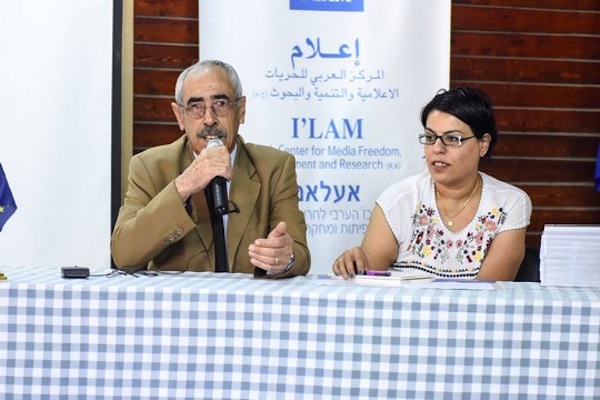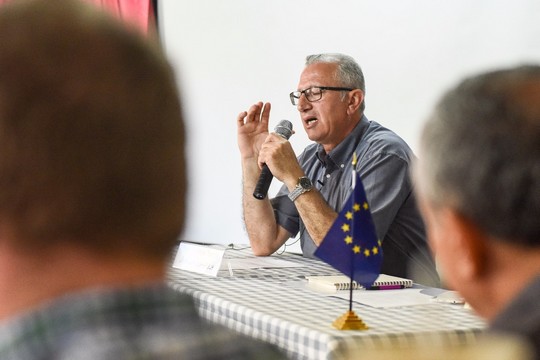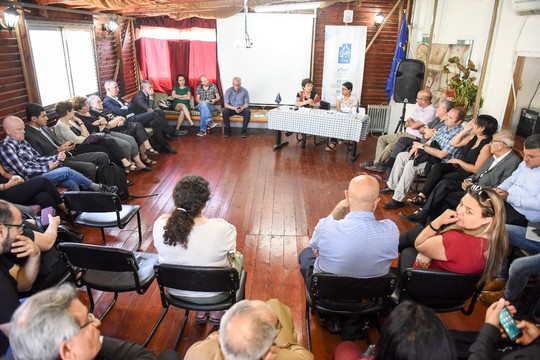Dozens of civil society, feminist, and anti-occupation groups form the ‘Council for the Protection of Freedoms’ to fight back against the government’s and public’s attacks against freedom of expression.

Representatives from over 30 civil society organizations gathered on Friday in Nazareth for the founding conference of the “Council for the Protection of Freedoms.” The council was established to fight back against the feeling among various organizations that their activities and freedom of expression are at risk. The goal will be to protect these freedoms from both the government as well as various tendencies among both Jewish and Arab society.
The conference organizers pointed to various examples in which these freedoms are being limited, including the nation-state bill, the cancellation of three events organized by left-wing NGO, Zochrot, the government’s new initiative to prevent left-wing NGOs from filing petitions to the High Court, the attacks on B’Tselem and Breaking the Silence, etc. On Saturday, following pressure from a right-wing student group, Hebrew University cancelled an academic conference focusing on academic research on Palestinian prisoners.
The initiative is being organized by I’lam Media Center, which works to protect and promote the rights of Arab journalists and media institutions, and the Van Leer Institute. The initiative includes independent journalists, former judges, and dozens of human rights, feminist, and anti-occupation organizations. According to Shai Lavi, the head of the Van Leer Institute, the initiative will strive to bring in additional organizations of different kinds, including cultural, religious, and academic groups. The council will be headed by Kholod Massalha, a Palestinian journalist and projects coordinator for I’lam.
“Over the past few years there have been growing doubts over the most basic freedoms. The assumption is that we are in a new reality, which requires a new mode of action,” said Professor Amal Jamal, the head of I’lam and a lecturer at Tel Aviv University, during the conference’s opening remarks. “There is a process of normalizing attacks on human rights organizations. This was not part of our reality in the past, and the fact that organizations and activists are being criminalized is unusual and dangerous. Although we haven’t reached a point in which we cannot speak out at all, we must still act before we get there. This means we must go beyond the differences between us — and there are differences — for the sake of maintaining a pluralistic lifestyle.”

According to Jamal, the council will be in existence for at least three years, with the first year being dedicated mainly to formulating goals and strategy in a large forum of all partners. The second and third year will be dedicated to implementing those decisions.
“The past few years have seen slightly less Jewish-Arab cooperation, and I praise this initiative for creating such a partnership for the sake of democracy,” said MK Yousef Jabarin (Joint List) at the conference. “Not only is freedom of speech of Arab society in danger, but that of society in general. Thus we need everyone who is oppressed to take part in the initiative.”
“The progressive camp is on the defense worldwide, whether in the United States, Britain, or other places — all this began earlier in Israel,” adds Dr. Yulia Zamlinski, who heads the NGO “Our Heritage – The Charter for Democracy,” which focuses on the situation of the Russian-speaking community in Israel. “The process of resistance and undoing the damage must also recognize the failures of the democratic camp, here and elsewhere. This indues recognizing the various interests of different communities, and speaking to every public in a different way, alongside building solidarity between different publics.”

Among the other speakers were representatives of Physicians for Humans Rights-Israel, the Arab Union for Human Rights, Kav LaOved, Achoti, B’Tselem, Coalition of Women for Peace, and others. Dr. Muhammad Odeh, a diplomat from the Palestinian Authority who also spoke at the conference, reminded attendees that Palestinians in the occupied territories suffer from both the occupation and a limited democratic space in their society.
The European Union will fund the council’s first three years of activity. Mark Gallagher, the EU’s deputy ambassador to Israel, said that the European Union is worried by the pressure being put on civil society organizations in Israel as well as in EU states, calling the council the “flagship” of all projects being supported by the EU in Israel.
This post was originally published in Hebrew on Local Call.

